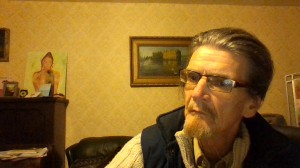Francisca Aguirre, Premio Nacional de las Letras 2018 El jurado la ha elegido “por estar su poesía (la más machadiana de la generación del medio siglo) entre la desolación y la clarividencia, la lucidez y el dolor" Francisca Aguirre, National Literature Prize 2018 The jury chose it "because its poetry is (the most Machadian* of the generation of the half century) between desolation and clairvoyance, lucidity and pain" * In the tradition of Antonio Machado https://elpais.com/cultura/2018/11/13 Francisca Aguirre was born in 1930 in Alicante, Spain, and fled with her family to France at the end of the Spanish Civil War, where they lived in political exile. When the Germans invaded Paris in 1942, her family was forced to return to Spain, where her father, painter Lorenzo Aguirre, was subsequently murdered by Francisco Franco's regime. Aguirre published Ítaca (1972), currently available in English (Ithaca [2004]), when she was 42 years old. Her work has garnered much critical success, winning the Leopoldo Panero, Premio Ciudad de Irún, and Premio Galliana, among other literary prizes. Aguirre is married to the poet Félix Grande and is the mother of poet Guadalupe Grande. From "NANAS PARA DORMIR DESPERDICIOS"
LULLABIES TO LULL THROWN AWAYS
by FRANCISCA AGUIRRE
Translated by Amparo Arrospíde & Robin Ouzman Hislop ***
NANA DE LAS SOBRAS A Esperanza y Manuel Rico Vaya
canción la de las sobras, eso sí que era una nana para dormir el hambre. Vaya canción aquella que cantaba mi abuela con aquella voz que era la voz de la misericordia disfrazada de voz angelical. Porque la voz de mi abuela nos cantaba la canción de las sobras. Y nosotras, que no conocíamos el pan, cantábamos con ella que las sobras de pan eran sagradas, las sobras de pan nunca se tiran. Siempre recordaré su hermosa voz cantando aquella nana mientras el hambre nos dormía.
**
LULLABY FOR LEFTOVERS To Esperanza and Manuel Rico Well, a leftovers song, that truly was a lullaby to lull hunger to sleep. Wow, that song my grandmother sang with a voice that was the voice of mercy disguised as the voice of an angel. Because my grandmother´s voice sang for us the leftovers song. And we, who did not know bread, sang together with her that bread leftovers were holy, bread leftovers shall never be thrown away. I will always remember her beautiful voice singing that lullaby while hunger lulled us to sleep. ** NANA DE LAS HOJAS CAÍDAS A Marián Hierro Casi todo lo que se pierde tiene música, una música oculta, inolvidable. Pero las hojas, esas criaturas parlanchinas que son la voz de nuestros árboles, tienen, como la luz, el agua y las libélulas una nana secreta y soñadora. Lo que se pierde, siempre nos deja un rastro misterioso y cantarín. Las hojas verdes o doradas cantan su desamparo mientras juegan al corro. Cantan mientras los árboles las llaman como llaman las madres a sus hijos sabiendo que es inútil, que han crecido y que se han ido a recorrer el mundo. **** LULLABY FOR FALLEN LEAVES To Marián Hierro Almost everything which is lost has a music, a hidden, unforgettable music. But leaves, those chattering creatures who are the voices of our trees have -- like light, water and dragonflies -- a secret dreamy lullaby. That which is lost to us, always leaves the mysterious trace of its song. Green or golden leaves sing of their neglect as they dance their ring a ring of roses. They sing while trees call to them as mothers do calling their children knowing it is futile, as they have grown up and left to travel the world over. ** NANA DE LAS CARTAS VIEJAS Tienen el olor desvalido del abandono y el tono macilento del silencio. Son desperdicios de la memoria, residuos de dolor, y hay que cantarles muy bajito para que no despierten de su letargo. En ocasiones las manos se tropiezan con ellas y el pulso se acelera porque notamos que las palabras como si fueran mariposas quieren bailar delante de nosotros y volver a contarnos el secreto que duerme entre sus páginas. Son las abandonadas, los residuos de un tiempo de desdicha, relatan pormenores de un combate y al rozarlas oímos el tristísimo andar de los presos en los penales. ** LULLABY FOR OLD LETTERS They give off the helpless smell of neglectfulness and the emaciated tone of silence. They are memory´s cast offs, residues of pain and should be sung to in a low croon so as not to awaken them from their lethargy. Sometimes your hands chance upon them and your pulse races because we realize that words wish to dance before us as if they were butterflies and tell us again the secret sleeping inside their pages. They are the neglected, the remnants of unhappy times, recounting the details of a struggle and as we brush them we hear the saddest steps of prisoners in jails. ** NANA DEL HUMO La nana del humo tiene muchos detractores, casi nadie quiere cantarla. Muchos dicen que el humo los ahoga, otros piensan que eso de dormir al humo no les da buena espina, que tiene algo de gafe. El humo no resulta de fiar: en cuanto asoma su perfil oscuro todo son malas conjeturas: se nos está quemando el bosque, aquella casa debe de estar ardiendo. El humo es un extraño desperdicio, tiene muy mala prensa. Es un abandonado, es un incomprendido; casi nadie recuerda que el humo es un vocero, un triste avisador de lo que se nos avecina. Y por eso, cuando lo escucho vocear con impotencia yo le canto la nana del silencio para que no se sienta solo. ** LULLABY FOR SMOKE The lullaby for smoke doesn´t get many supporters, almost nobody wants to sing its song. Many say smoke stifles them, others think to lull smoke to sleep makes them queasy, that it´s a bit of a jinx. Smoke is not trustworthy: as soon as it rears its dark head it conjures up conjectures -- a forest fire, a house burning down. Smoke is a weird remain, it´s got bad reports. It´s a reject, it´s a misunderstood thing; almost nobody remembers smoke is a herald, a sad forwarner of what looms over us. That´s why, when I hear it calling out helplessly, I sing to it the lullaby for silence so that it doesn´t feel so lonely. *** Translators: Amparo Arrospide (Argentina) is a Spanish poet and translator. She has published seven poetry collections, Mosaicos bajo la hiedra, Alucinación en dos actos y algunos poemas, Pañuelos de usar y tirar, Presencia en el Misterio, En el Oido del Viento, Hormigas en Diáspora and Jaccuzzi, as well as poems, short stories and articles on literary and film criticism in anthologies and in both national and foreign magazines. She has received numerous awards. Robin Ouzman Hislop is Editor of Poetry Life and Times his publications include All the Babble of the Souk and Cartoon Molecules collected poems and Key of Mist the recently published Tesserae translations from Spanish poets Guadalupe Grande and Carmen Crespo visit Aquillrelle.com/Author Robin Ouzman Hislop about author. See Robin performing his work Performance (University of Leeds) and his latest Collected Poems Volume at Next-Arrivals




